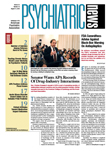As the obesity epidemic spreads throughout the world—China seems to be the latest casualty, according to the July/August Health Affairs—psychiatric researchers are stepping up their efforts to discover the mental health ramifications of obesity.
For example, they have found associations between anxiety, depression, and binge eating and obesity, although whether these mental disorders contribute to obesity or result from it is not clear (Psychiatric News, September 16, 2005; August 18, 2006). They have linked late-teen depression with early-adulthood obesity in women (Psychiatric News, November 21, 2003). And now Claudia Thomas, Ph.D., of University College London and colleagues have coupled physical abuse in childhood with midlife obesity. Results were published in the May Pediatrics.
A general population sample representative of United Kingdom adults in midlife—some 9,400 subjects born in 1958—participated in this study. At ages 7, 11, and 16, each subject was visited by a study investigator and evaluated for negative experiences such as physical or emotional neglect, domestic tension, parental alcoholism, or mother having little interest in a child's education.
At age 45 each subject provided his or her recollections about negative experiences that he or she had encountered as a child—say, verbal, physical, or sexual abuse; parental depression; an authoritarian upbringing; or parental separation or divorce. Also at age 45, each subject's body mass index was determined.
The researchers then used the prospectively and retrospectively obtained negative-experience findings, as well as subjects' body mass index at age 45, to determine whether negative childhood experiences could be linked with obesity at age 45.
They found that such a link did in fact exist. Even when possibly confounding factors were considered, a highly significant link was found between physical abuse and midlife obesity, and statistically significant links were found between verbal abuse, a strict upbringing, and a mother having little interest in her child's education and midlife obesity.
In contrast, no significant association was found between other negative childhood experiences—such as not getting along with parents, parental separation or divorce, or parental alcoholism—and midlife obesity. Intriguingly, a significant inverse association was found between maternal depression during childhood and midlife obesity.
Thus, “Some childhood adversities increase the risk of obesity in adulthood,” Thomas and her colleagues concluded in their study report, whereas others do not, and still others, such as parental depression, might even be protective in this regard. However, the mechanisms underlying such associations remain to be clarified, they pointed out.
The study was funded by the United Kingdom National Health Service, the United Kingdom Medical Research Council, and England's Department of Health.
